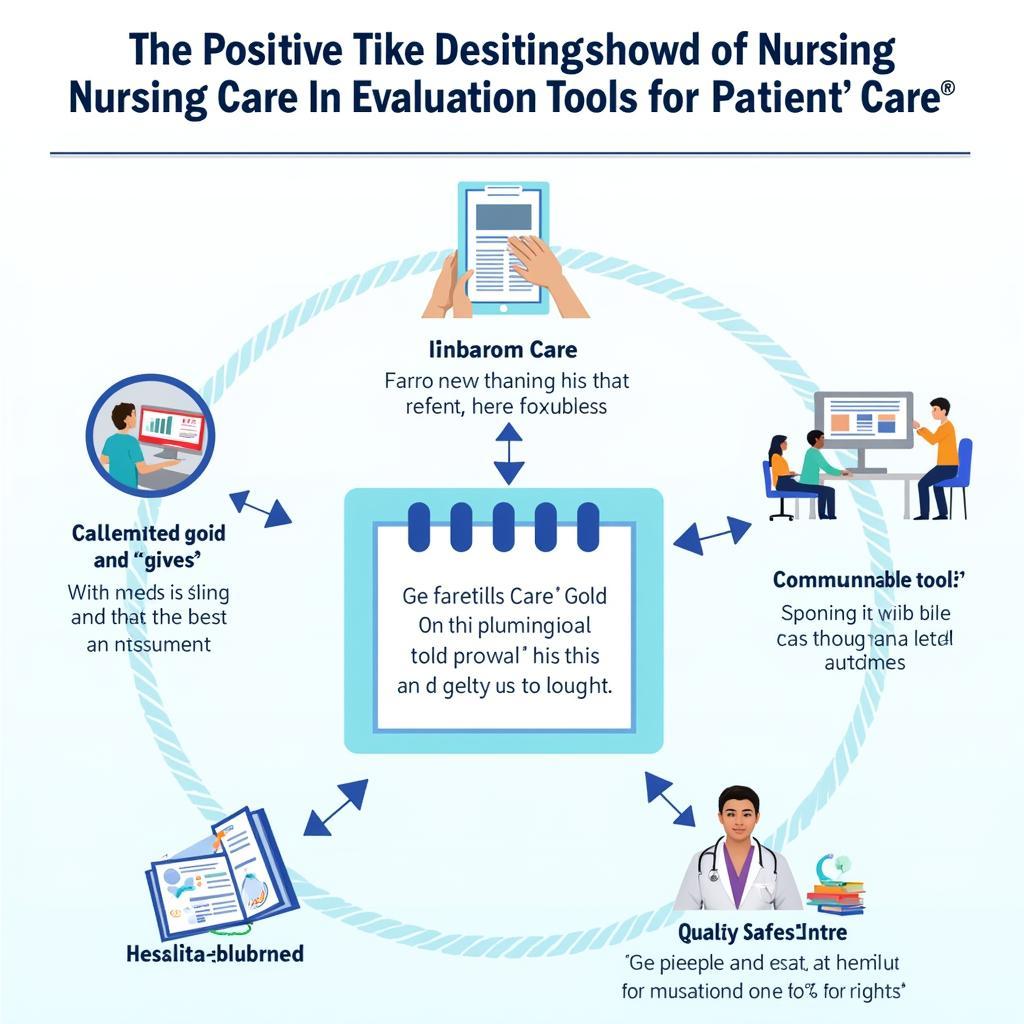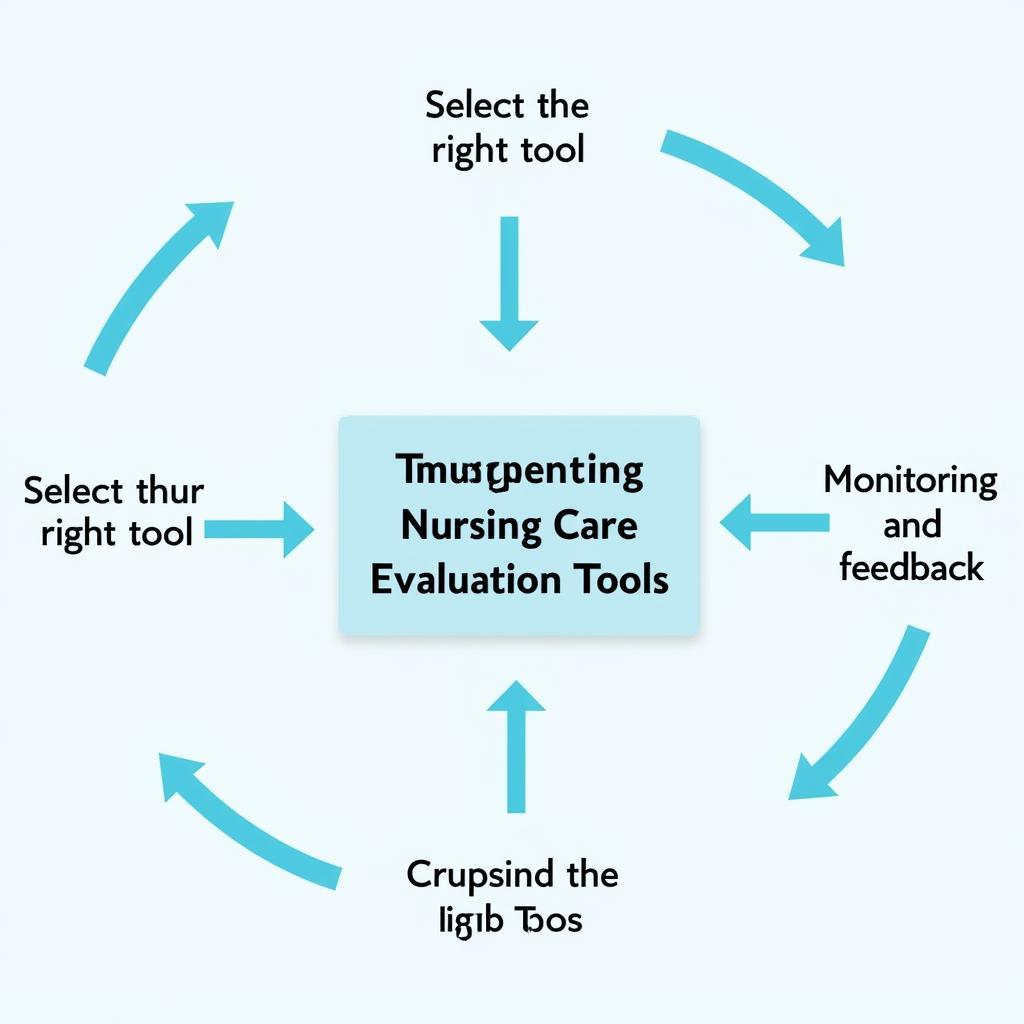Nursing Care Evaluation Tools are essential for ensuring quality care and positive patient outcomes. These tools provide a structured framework for assessing the effectiveness of nursing interventions, identifying areas for improvement, and promoting evidence-based practice. This article will delve into the importance of these tools, explore various types, and discuss how they contribute to better patient care.
Choosing the right nursing care evaluation tool is crucial. Factors to consider include the specific patient population, the healthcare setting, and the goals of the evaluation. For instance, a tool designed for acute care may not be suitable for long-term care. Similarly, evaluating pain management requires a different approach than assessing functional ability. the chelsea critical care physical assessment tool provides a valuable resource for acute care settings, focusing on the comprehensive physical assessment of critically ill patients.
Types of Nursing Care Evaluation Tools
Several types of nursing care evaluation tools exist, each with its unique strengths and applications. Some common categories include:
Standardized Assessment Tools
These tools offer a consistent and objective way to measure patient characteristics, such as functional status, pain levels, and cognitive abilities. Standardized tools allow for comparisons across different patients and settings, facilitating benchmarking and quality improvement initiatives.
Checklists and Rating Scales
Checklists provide a structured list of criteria to assess specific aspects of nursing care. Rating scales allow nurses to quantify observations and judgments, enabling a more nuanced evaluation.
Patient Satisfaction Surveys
These surveys gather feedback directly from patients regarding their experiences with nursing care. Patient satisfaction is a valuable indicator of the quality of care and can highlight areas needing improvement. Are patient satisfaction surveys truly effective in capturing the full picture of care quality? While they offer valuable insights, they should be used in conjunction with other evaluation methods for a comprehensive assessment.
Outcome Measures
Outcome measures focus on the results of nursing care, such as reductions in hospital readmissions, improvements in functional status, and decreased pain levels. These measures provide valuable evidence of the impact of nursing interventions.
How Nursing Care Evaluation Tools Enhance Patient Care
Nursing care evaluation tools play a vital role in enhancing patient care in several ways:
- Improved Quality of Care: By systematically evaluating nursing interventions, these tools identify areas for improvement and promote evidence-based practices.
- Enhanced Patient Safety: Evaluating care processes helps identify potential risks and implement strategies to mitigate them, contributing to a safer patient environment.
- Better Patient Outcomes: Focusing on patient outcomes through evaluation ensures that nursing care is aligned with patient goals and contributes to positive health outcomes.
- Increased Accountability: Evaluation tools provide data-driven insights that can be used to track progress, demonstrate the value of nursing care, and support accountability. acuity measurement tool for long term care assists in accurately assessing patient needs and allocating resources effectively.
 Impact of Nursing Care Evaluation Tools on Patient Care
Impact of Nursing Care Evaluation Tools on Patient Care
Implementing Nursing Care Evaluation Tools Effectively
Effective implementation of nursing care evaluation tools requires careful planning and execution. Key considerations include:
- Selecting the right tool: Choose a tool that aligns with the specific needs of the patient population, the healthcare setting, and the evaluation goals. For auditing nursing care plans, a dedicated tool like the nursing care plan audit tool can be highly beneficial.
- Training staff: Provide adequate training to nurses on how to use the chosen tool effectively and interpret the results.
- Integrating into workflow: Incorporate the evaluation process into the existing nursing workflow to ensure regular and consistent use. Tools like the coordinated care plan tool can facilitate streamlined care coordination and planning.
- Monitoring and feedback: Regularly monitor the evaluation process, provide feedback to nurses, and make adjustments as needed.
“Regular evaluation is not just a bureaucratic exercise,” says Dr. Emily Carter, RN, PhD, “it’s a fundamental component of providing high-quality, patient-centered care. It empowers nurses to continuously learn and improve.”
Choosing the Best Tool: Key Considerations
When selecting a nursing care evaluation tool, consider the following factors:
- Psychometric properties: Ensure the tool has established reliability and validity.
- Ease of use: Choose a user-friendly tool that is easy for nurses to understand and implement.
- Cost: Consider the cost of the tool and any associated training or implementation expenses. safer nursing care tool nice offers guidance on ensuring safe staffing levels, a crucial aspect of quality care.
- Clinical relevance: Select a tool that is relevant to the specific clinical setting and patient population.
“The right tool can empower nurses to deliver the best possible care,” notes Dr. David Miller, RN, MSN. “It’s about choosing a tool that fits the specific needs of the environment and the patients we serve.”
Conclusion
Nursing care evaluation tools are indispensable for ensuring quality care and positive patient outcomes. By providing a structured framework for assessing nursing interventions, these tools empower nurses to improve practice, enhance patient safety, and achieve better outcomes. Choosing the right tool and implementing it effectively is crucial for maximizing its benefits and contributing to a culture of continuous improvement in nursing care. This ensures patient needs are met and the highest standards of care are maintained, furthering the pursuit of excellence in the healthcare profession.
FAQ
- What is a nursing care evaluation tool?
- Why are nursing care evaluation tools important?
- What are the different types of nursing care evaluation tools?
- How can I choose the right evaluation tool for my setting?
- How can I implement evaluation tools effectively?
- What are the benefits of using evaluation tools?
- How can I ensure the accuracy of evaluation data?
 Best Practices for Implementing Nursing Care Evaluation Tools
Best Practices for Implementing Nursing Care Evaluation Tools
Need assistance with Car Diagnostics? Contact us via WhatsApp: +1(641)206-8880, Email: cardiagtechworkshop@gmail.com or visit us at 910 Cedar Lane, Chicago, IL 60605, USA. Our 24/7 customer support team is ready to help.

Leave a Reply